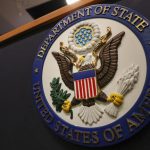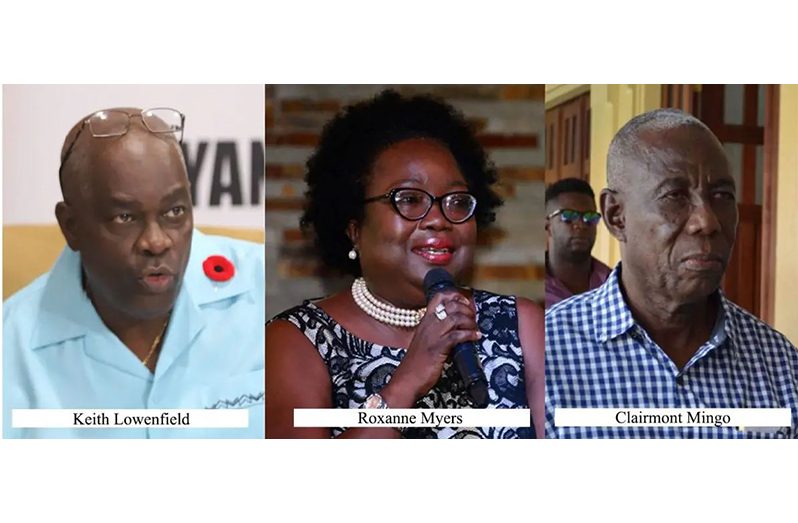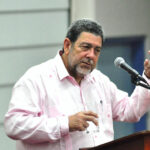(GUYANACHRONICLE)Police involved in wrongdoing
– Calls for campaign financing laws
IT has been revealed by the Presidential Commission of Inquiry (CoI) investigating the 2020 General and Regional Elections that senior officials at GECOM conspired and collaborated to divert votes to the APNU+AFC coalition instead of upholding the integrity of the electoral system.
Chairman Stanley John and commissioners — former Chancellor Carl Singh and Senior Counsel Godfrey Smith, on Wednesday, handed over these findings and their report to President Dr. Irfaan Ali based on evidence from the many witnesses who testified along with the reports of the international observers.
“…our inquiry reveals that there were, in fact, shockingly brazen attempts by Chief Election Officer (CEO), Keith Lowenfield, Deputy Chief Election Officer (DCEO), Roxanne Myers and Returning Officer (RO) Clairmont Mingo to derail and corrupt the statutorily prescribed procedure for the counting, ascertaining and tabulation of votes of the March 2nd election, as well as the true declaration of the results of that election, and that they did so – to put it in unvarnished language of the ordinary man – for the purpose of stealing the election,” the commissioners stated in their report.
The report found that Lowenfield blatantly made decisions and employed procedures in direct contradiction to the law and the will of the people. The findings also revealed that GECOM staffers ignored specific instructions from the court, used illegal and manipulated materials, and sided with APNU+AFC agents to berate observers whenever objections were raised.
After careful scrutiny, the CoI commissioners concluded that there was a conscious and deliberate – even brazen –effort to violate the provisions of section 84(1) of the Representation of the People Act (RoPA)
In so doing, certain “senior GECOM officials” abandoned all need for neutrality and impartiality, and demonstrated a bias for the APNU+AFC and, in the course of events over those days, showed an “open connection” with that party, and by their efforts sought a desired result for the coalition.
As such, the commissioners said that after consideration and analysis of the evidence, Lowenfield, Mingo and Myers “were principally responsible for clear and deliberate attempts to frustrate, obstruct and subvert the ascertainment of votes in electoral district No. 4.”
Against this backdrop, the CoI found that the trio undoubtedly made a premature and unlawful declaration of falsified results which showed the APNU+AFC was the winner of electoral district No. 4.
“This, we believe, was the ultimate goal of the CEO, the DCEO and the RO,” the Commissioners said in their report.
The report also found that the structure of GECOM is, at its core, politicised, making it difficult for it to operate with any efficiency or effectiveness.
As such, the commissioners found that consideration should be given to amending this to allow for more balanced participation from other organisations or professionals with technical expertise, thereby reducing the politicisation of the electoral process.
It said that the Carter Center noted in its report on the 2001 elections, “As part of electoral reform efforts, Guyana should give careful consideration to alternative models, possibly reducing or eliminating political party representation and increasing the role of independent members of civil society and professional experts.”
GPF WENT ROGUE
The CoI also found that ranks of the Tactical Service Unit (TSU) of the Guyana Police Force (GPF) were also implicated in wrongdoings.
On March 5, 2020, ranks and officers from at least three sections of the Guyana Police Force converged at Ashmin’s building in the midst of a bomb scare. Several of those ranks were accused of aiding attempts to clear the building, even after concern was expressed about the safety of Statements of Poll (SoPs).
During the evidence submitted to the CoI, it was found that the Police Force seemed to have been acting under “direct political direction.” Members of the Private Sector Commission (PSC) and its observers “witnessed the deliberate and forceful intervention of heavily armed police in preventing the oversight of SoPs at GECOM by physically removing accredited political party representatives, accredited observers, including private sector observers, and the members of the media.”
Additionally, another witness, former Police Division 4 ‘A’ Commander, Edgar Thomas, in his evidence, said that a number of security decisions were made without his knowledge during the 2020 elections fiasco and that he was later punished for refusing to carry out instructions.
Thomas was reassigned and was reportedly told that retired Police Commissioner Leslie James was not pleased with his performance and, as a result, was not answering his cell phone while on the ground. Thomas had testified that the reassignment was not for his rank and noted that he was provided with no accommodations to work.
Meanwhile, James had testified that his ranks might have “violated” his orders and went rogue.
Based on the witnesses’ evidence, the commissioners’ report said that it became evident that there is a pressing need to implement a prohibition on police officers openly displaying their political affiliations during elections.
“The role of the police is to preserve law and order and detect crime. There should be some prohibition against police officers openly showing partisanship in elections, and more importantly so, they should play no part in the election process on polling day save for such functions that are delegated to them by the commissioner of police,” the commissioners said in their report.
CAMPAIGN FINANCING
The CoI also found that except for the provisions set out in RoPA, there is no legislation applicable to campaign financing in Guyana.
“Accordingly, there is a lack of transparency and accountability regarding political parties and campaign financing. Political parties have historically raised funds without any limitations regarding the source or amount of donation and with very little obligation to disclose election expenses.
“There is a strong need for such legislation as there is a perception that persons and/or corporations who give large donations stand to gain political favours,” the report said.
The Commissioners hope that this report will help to bring closure to a “sad and shameful” chapter in the electoral history of Guyana in which the integrity of, and trust in, the electoral system of Guyana was undermined and temporarily overthrown by the shenanigans of election officials at the highest level of the system.
“We also hope that what this report reveals might contribute to the process of restoring confidence to the people of Guyana in their elected officials and their electoral system so that, going forward, they can be assured that the regional and general elections are conducted in a free, fair and transparent manner,” the commissioners said.










